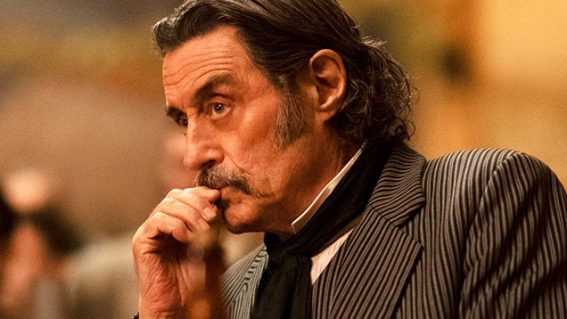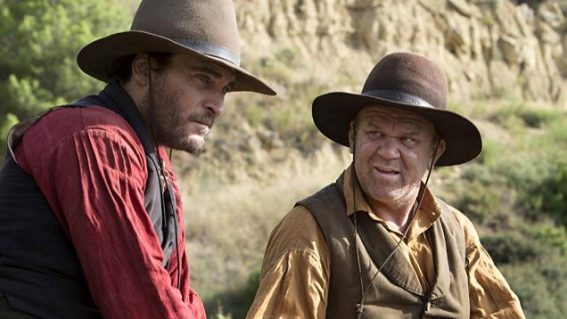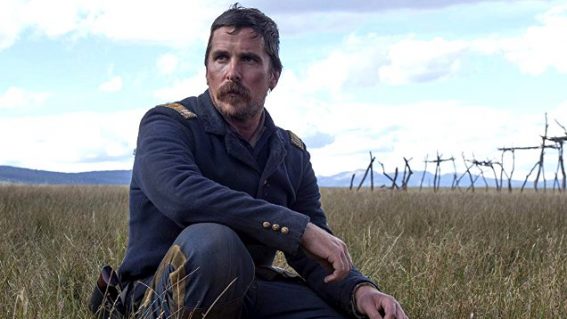10 reasons why Deadwood is one of the greatest TV shows of the modern era
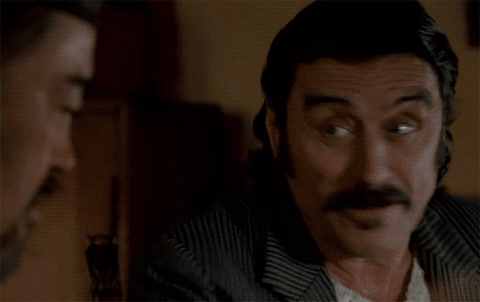
Now that Deadwood has official concluded with its feature-length finale, Deadwood: The Movie, Blake Howard lists 10 reasons why this inimitable, profanity-riddled production is one of the greatest TV shows of the modern era. Some spoilers below.
It’s early in the 2000s, and David Milch, the maverick visionary behind critically adored rating juggernauts Hill Street Blues and NYPD Blue, walks into HBO. His latest pitch is a tale of police attempting to maintain order amid the chaos reaped by the mad Roman Emperor Nero. HBO’s response – to paraphrase – is: we already have a show about Rome. Titled, in fact, Rome.
Milch’s idea nevertheless contained a core question he did not give up on: how does one remain morally incorruptible in a corrupt system? So it was off to 1890s, Dakota Territory, the Black Hills and the town of Deadwood. Milch, taking significant license with real historical figures, weaves both intimate and epic televisual prose into a story about the birth of modern America.
Three sublime seasons, 36 episodes, 2980 “fucks,” around 300 “cocksuckers” later (not including those uttered in the movie) Milch’s redefining tale of the Old West became a gold standard to which future cinematic and televisual interpretations would be compared.
With the series-concluding Deadwood: The Movie having now arrived, here are 10 reasons why Deadwood is undeniably one of the great shows of the modern era.
#1 A kick arse goodbye movie
The long-awaited farewell to Deadwood has arrived in the form of Deadwood: The Movie. Good news, folks: it’s fucking great.
Embracing the real 10 year gap between the conclusion of the show, the movie begins with now Senator George Hearst (Gerald McRaney ) returning to Deadwood in the newly minted state of South Dakota and ply his trade of taking what he needs to expand his empire. Unfortunately for Hearst, a decade of additional vintage for his sparring partners in Deadwood has considerably improved their potency.
Matt Zoller Seitz said it best: “Essentially it’s like the movie equivalent of [a] dream where somebody you love very much has come back from the dead just for a couple of days to say a proper goodbye.”
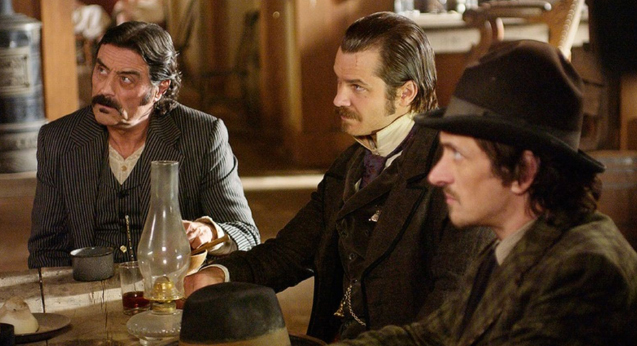
#2 Who’ll take the letter to his wife?!
On a cold dark Montana evening, in the prelude to Deadwood, U.S Marshall Seth Bullock (Timothy Olyphant) has his arm in a sling and is writing out handover instructions for his successor, before he and partner Sol Star – the meticulous and warm John Hawkes – head to make a new life in Dakota Territory. Just as he’s enjoying a cheeky faux negotiation with a prisoner (James “Son #1” Parks) about an impulse pardon, an angry crowd assemble wanting to execute mob justice.
Rather than being a victim to a hoard of angry vigilantes, Bullock makes the call to enact the law by his hand. Before he does, he requests the prisoner’s final words and has them logged to send to his family. Bullock, mere minutes into this unbelievably resonant series, distills his conflicted principles in such a way that if it were a book, you’d say from here on in it was simply un-put-down-able.
#3 Profanity & Soliloquy
One could mention that there’s never been another show that could deliver such florid and intoxicating dialogue from the co-lead of the series while he receives a blowjob. However, Milch and his cohort of creators use language as a guide to status. It’s a delight to watch education and sophistication expressed with such overt attempts to attract and secure power, which like life, happens in a divine spectrum.
In the case of the delightful parasite E.B Farnham, he’s continuously inflating conceptions of his status – dancing an elaborate ballet of words while incongruously adorned in rags assembled in half remembered forms of fashion. In contrast, Mr Wu (Keone Young) develops an entire language with Al Swearengen (Ian McShane) adjusting the intonation and inflection of the word “cocksucker.” And as for McShane himself as Swearengen, there mightn’t be a human better at winding up and both emphasising and equalising insight with punctuative fucks.
#4 Loyalty and Calamity
There’s undoubtedly a musicality to the character of Calamity Jane, played strikingly by Robin Weigert. She’s a walking battle rap levelling insults and doling out “cunts,” “fucks” and “cocksuckers” that weave into a protective aura around her being. Weigert is an ongoing revelation in hostility, in attempted self-destruction by alcohol, in discovery through her relationship with Joanie Stubbs (Kim Dickens) and finally in her salvation, which comes from providing care for others.
#5 What’s in the Box?! – Chief’s Confessional
During the chaotic fallout after Wild Bill’s death, a rider returns to Deadwood. Part omen, part call back, part ironic totem – a Mexican rider returns with the head of a “Savage”, a Native American, and holds it aloft expecting a hero’s welcome. The town is in a state of delirium and despite Cy Tolliver (Powers Boothe) querying Al as to its whereabouts, and being dismissed, the importance becomes apparent later.
After Al comes off second best in his physical altercation with Bullock, his insular and determined recovery take shape part in self-imposed isolation. Al unpacks the world in monologues, and McShane’s counselling sessions with the Chief are divine.

#6 The women behind the power brokers
Trixie (Paula Malcomson) and Joanie Stubbs (Kim Dickens) are the two key women behind the power brokers of Deadwood, Al and Cy. Trixie is raw; there’s no flash to her fucking. She’s down to business and uncompromising.
Her impulse to protect herself (and eventually her wider family) makes her little Derringer pistol crack like an atom bomb. Joanie (Dickens) is much more adept to the ‘game’ – manipulation, flirtation and underhanded influence. When facing the cataclysmic, she’s able to pause for self-preservation. Dickens conveys deep emotional and psychological turmoil with poise. Joanie sees how the world is and aspires for the way it ought to be; when the forces of fate come for Trixie, she’s packing heat.
#7 Doc Cochran and arcane medical practices
Deadwood pulls up a front-row pew to arcane medical practices of the last century. A kidney stone operation is one horrendously arcane, invasive and confronting experience. Doc Cochran (Brad Dourif) is an ongoing wonder. He stalks around haunted by the overwhelming familiarity with death and mutilation in the wake of the war. He sees behind the curtain of every operation and casts his judgement on their care for their people accordingly.
#8 Who’s getting fed to Mr Wu’s pigs?
Once you become a fan of Deadwood, and its impression of the West, one cannot help but start imagining how mythical Western figures would fare in this world. Tombstone lead Wyatt Earp (Kurt Russell) seems like he’s got the starch to survive in Deadwood for a time. Doc (Val Kilmer), depicted in the same film, would be copping dope within an hour of arriving and likely would end up face down in the muck. Everyone in the 1995 Sam Raimi film The Quick and the Dead would fed to the pigs inside an hour.
#9 Race becomes a cipher for power
Race relations in Deadwood are candidly ugly, which is in keeping with the historical facts. Race in Deadwood is a cipher for power. The white European American male is the top tier, women are significantly down the ladder, and clawing for ascension are non-English speakers, Mexicans, African Americans and Chinese.
Milch and co. masterfully express the vice-like pressure of racial persecution by taking a detour into the life of side characters such as Hostetler (Richard Gant), the owner of the livery who eventually breaks from his ongoing abuse to take his life. His offsider General Fields, played with the singular rhythm of Franklin Ajaye, expresses the constant state of fear of the newly emancipated, especially in the presence of desperate, entitled European Americans. Quentin Tarantino once said: “Westerns say more about the time they’re produced than the time they’re set.”
#10 This. Fucking. Cast.
Restricting myself to 10 reasons has got me by the balls. I don’t have enough time to talk about how the sermons from Reverend Smith (Ray McKinno) start obsequious and transition to haunting the more they ruminate. I didn’t mention the divine Aunt Lou (Cleo King) demonstrating the Stockholm Syndrome of being in service of a sociopathic oligarch.
I haven’t articulated my appreciation for the terrific relationship between Al and protege Silas Adams (Titus Welliver). I’ve neglected even to mention Charlie Utter ( Dayton Callie), the witness to Wild Bill’s progressive downfall. I haven’t mentioned the essential Molly Parker as Alma Garret, whose beauty is only matched by her determination. But hey, at least I found a way to squeeze a mention of ’em in before wrapping up. This fucking cast is amazing.


